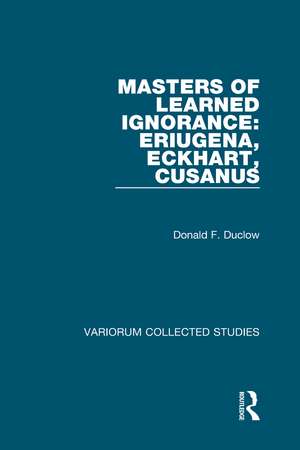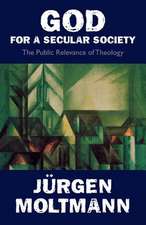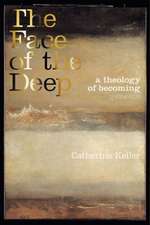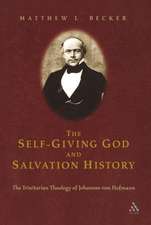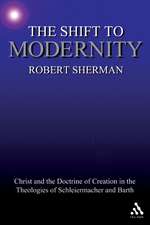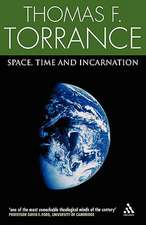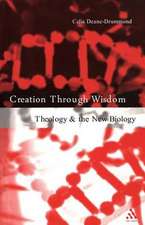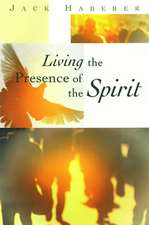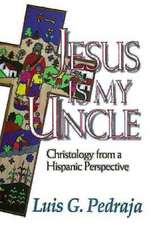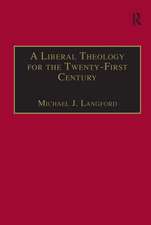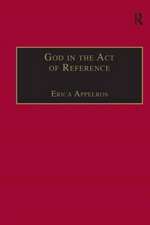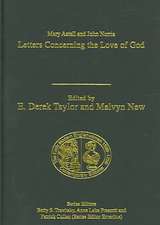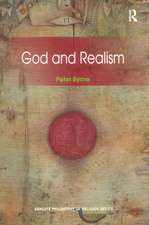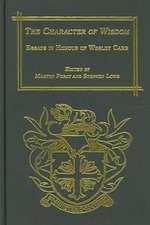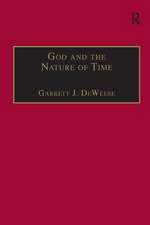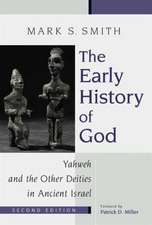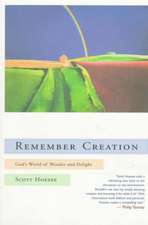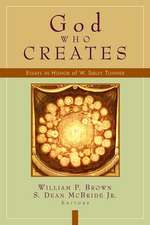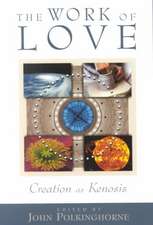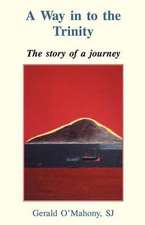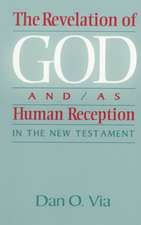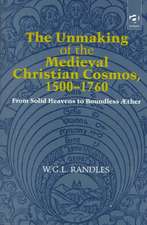Masters of Learned Ignorance: Eriugena, Eckhart, Cusanus: Variorum Collected Studies
Autor Donald F. Duclowen Limba Engleză Hardback – 28 oct 2006
Din seria Variorum Collected Studies
- 9%
 Preț: 938.85 lei
Preț: 938.85 lei -
 Preț: 311.41 lei
Preț: 311.41 lei -
 Preț: 351.48 lei
Preț: 351.48 lei -
 Preț: 313.38 lei
Preț: 313.38 lei -
 Preț: 386.77 lei
Preț: 386.77 lei -
 Preț: 325.68 lei
Preț: 325.68 lei -
 Preț: 396.00 lei
Preț: 396.00 lei -
 Preț: 312.75 lei
Preț: 312.75 lei - 9%
 Preț: 1041.23 lei
Preț: 1041.23 lei -
 Preț: 258.66 lei
Preț: 258.66 lei -
 Preț: 299.55 lei
Preț: 299.55 lei - 9%
 Preț: 938.08 lei
Preț: 938.08 lei -
 Preț: 343.33 lei
Preț: 343.33 lei -
 Preț: 311.18 lei
Preț: 311.18 lei - 9%
 Preț: 937.13 lei
Preț: 937.13 lei -
 Preț: 341.55 lei
Preț: 341.55 lei -
 Preț: 320.00 lei
Preț: 320.00 lei - 34%
 Preț: 764.20 lei
Preț: 764.20 lei - 22%
 Preț: 312.43 lei
Preț: 312.43 lei - 34%
 Preț: 739.65 lei
Preț: 739.65 lei - 34%
 Preț: 764.20 lei
Preț: 764.20 lei - 34%
 Preț: 680.73 lei
Preț: 680.73 lei - 26%
 Preț: 247.40 lei
Preț: 247.40 lei - 34%
 Preț: 485.78 lei
Preț: 485.78 lei - 34%
 Preț: 764.20 lei
Preț: 764.20 lei - 34%
 Preț: 767.07 lei
Preț: 767.07 lei - 34%
 Preț: 764.20 lei
Preț: 764.20 lei - 34%
 Preț: 769.51 lei
Preț: 769.51 lei - 34%
 Preț: 764.20 lei
Preț: 764.20 lei - 34%
 Preț: 826.68 lei
Preț: 826.68 lei - 25%
 Preț: 225.28 lei
Preț: 225.28 lei - 25%
 Preț: 225.54 lei
Preț: 225.54 lei - 34%
 Preț: 736.38 lei
Preț: 736.38 lei - 34%
 Preț: 738.43 lei
Preț: 738.43 lei - 25%
 Preț: 226.52 lei
Preț: 226.52 lei - 33%
 Preț: 491.66 lei
Preț: 491.66 lei - 34%
 Preț: 485.78 lei
Preț: 485.78 lei - 34%
 Preț: 485.78 lei
Preț: 485.78 lei - 36%
 Preț: 739.17 lei
Preț: 739.17 lei - 38%
 Preț: 766.34 lei
Preț: 766.34 lei - 31%
 Preț: 473.94 lei
Preț: 473.94 lei - 18%
 Preț: 807.71 lei
Preț: 807.71 lei - 38%
 Preț: 774.91 lei
Preț: 774.91 lei - 34%
 Preț: 764.20 lei
Preț: 764.20 lei - 34%
 Preț: 764.20 lei
Preț: 764.20 lei - 51%
 Preț: 485.78 lei
Preț: 485.78 lei - 34%
 Preț: 485.78 lei
Preț: 485.78 lei - 34%
 Preț: 769.10 lei
Preț: 769.10 lei - 34%
 Preț: 766.65 lei
Preț: 766.65 lei - 18%
 Preț: 1019.01 lei
Preț: 1019.01 lei
Preț: 989.77 lei
Preț vechi: 1495.38 lei
-34% Nou
Puncte Express: 1485
Preț estimativ în valută:
189.40€ • 198.24$ • 157.63£
189.40€ • 198.24$ • 157.63£
Carte tipărită la comandă
Livrare economică 31 martie-14 aprilie
Preluare comenzi: 021 569.72.76
Specificații
ISBN-13: 9780860789956
ISBN-10: 0860789950
Pagini: 346
Dimensiuni: 156 x 234 x 25 mm
Greutate: 0.64 kg
Ediția:1
Editura: Taylor & Francis
Colecția Routledge
Seria Variorum Collected Studies
Locul publicării:Oxford, United Kingdom
ISBN-10: 0860789950
Pagini: 346
Dimensiuni: 156 x 234 x 25 mm
Greutate: 0.64 kg
Ediția:1
Editura: Taylor & Francis
Colecția Routledge
Seria Variorum Collected Studies
Locul publicării:Oxford, United Kingdom
Cuprins
Contents: Preface; Introduction: Pseudo-Dionysius, John Scotus Eriugena, Nicholas of Cusa: an approach to the hermeneutic of the divine names. Part 1 John Scottus Eriugena: Divine nothingness and self-creation in John Scotus Eriugena; Nature as speech and book in John Scotus Eriugena; Dialectic and christology in Eriugena's Periphyseon; Isaiah meets the Seraph: breaking ranks in Dionysius and Eriugena?; Denial or promise of the tree of life? - Eriugena, Augustine and Genesis 3:22b; Virgins in paradise: deification and exegesis in Periphyseon V, (co-authored with Paul A. Dietrick); Hell and damnation in Eriugena, (co-authored with Paul A. Dietrick). Part 2 Meister Eckhart: Hermeneutics and Meister Eckhart; Meister Eckhart on the Book of Wisdom: commentary and sermons; 'Whose image is this?' in Eckhart's Sermones; 'My suffering is God': Meister Eckhart's Book of Divine Consolation; The hungers of Hadewijch and Eckhart. Part 3 Nicholas of Cusa: Nicholas of Cusa's 'conjectural' neoplatonism; The dynamics of analogy in Nicholas of Cusa; The analogy of the word: Nicholas of Cusa's Theory of Language; Gregory of Nyssa and Nicholas of Cusa: infinity, anthropology and the Via Negativa; Anselm's Proslogion and Nicholas of Cusa's Wall of Paradise; Nicholas of Cusa in the margins of Meister Eckhart: codex Cusanus 21; Mystical theology and intellect in Nicholas of Cusa. Index.
Notă biografică
Donald F. Duclow is Professor Emeritus of Philosophy at Gwynedd-Mercy College, USA.
Descriere
In these papers Duclow views the thought of Eriugena, Eckhart and Cusanus through the lens of contemporary philosophical hermeneutics. He highlights the interplay of creativity, symbolic expression and language, interpretation and silence as they comment on the mind's work in naming God. This work itself becomes mystical theology when negation opens into a silent awareness of God's presence, from which the Word once again 'speaks' within the mind. Comparative studies with Gregory of Nyssa, Pseudo-Dionysius, Anselm and Hadewijch suggest the book's wider implications for medieval philosophy and theology.
